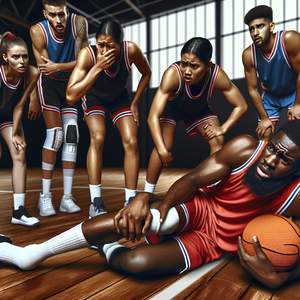Beyond the Numbers: The Life and Challenges of Practice Squad Players

Life for a practice squad player is anything but glamorous. Unlike their counterparts on the active roster, who bask in the limelight of game day, practice squad members engage in intense training sessions, often waking up before dawn to prepare for workouts that push their physical limits. A typical day may begin with early morning meetings followed by hours of practice, where they simulate plays and strategies to help the starting players prepare for upcoming games. Consider the story of a practice squad running back, who, after being released from another team, finds himself in a new city with new teammates. Every day, he trains harder than ever, not only to showcase his skills but also to prove he deserves a chance to play on game day. This determination often comes at a personal cost; many practice squad players face financial instability, moving frequently and living in shared accommodations, all while trying to maintain their focus on football. The financial aspect is significant, as practice squad salaries can range from approximately $11,500 to $16,000 per season, depending on the player's experience and the team's salary structure. This amount, while a decent supplement for some, is far less than what active players earn, making it a challenge for many to sustain a comfortable lifestyle while pursuing their dreams.
Mental and Physical Challenges
The mental toll of being on the practice squad can be overwhelming. These athletes constantly grapple with feelings of uncertainty and doubt. Despite being professionals, the reality is that only a select few will ever get called up to the active roster. The pressure to perform during practice can lead to anxiety and stress, as players understand that every moment on the field is a chance to impress coaches and secure their future in the league. Take the example of a former practice squad linebacker who describes the emotional rollercoaster of being on the verge of being cut. “You’re always on edge,” he recalls. “You want to show what you can do, but you also know there’s a chance it could all end tomorrow.” This high-stakes environment forces players to develop resilience, pushing them to overcome both physical and psychological barriers. In addition to the pressures of performance, practice squad players face the constant threat of injury. The intensity of training and the physicality of the sport mean that players must be on guard, knowing that a single misstep could not only sideline them but also jeopardize their careers. The fear of injury adds another layer of stress, as players understand that their value is often tied to their availability.
Sacrifices for a Shot at the Big Leagues
For many practice squad players, the path to the NFL is paved with sacrifices. Some have families they leave behind, while others forego stable jobs and traditional career paths in favor of chasing their football dreams. The uncertainty of their situation often weighs heavily on them, as they balance the desire to succeed with the reality of their circumstances. Consider the story of a practice squad wide receiver who worked a part-time job in the offseason to make ends meet. His commitment to football meant late nights at work followed by early morning practices, with little time left for anything else. “You have to love the game to make it work,” he explains. “It’s not just about the money; it’s about proving to yourself that you can do it.” The sacrifices extend beyond financial stability; relationships can also suffer. Players often spend months away from their families, trying to make the most of their time on the practice squad. This can lead to feelings of isolation and loneliness, as the demands of football take precedence over personal connections.
The Human Side of Football
While fans often rally behind star players, the stories of practice squad players remind us of the human side of the sport. These athletes embody passion, perseverance, and dedication, often going unnoticed in the grand narrative of the NFL. Their struggles and triumphs contribute to the fabric of the league and highlight the sacrifices made for success.
In conclusion, the life of a practice squad player is a testament to the unwavering spirit of those who refuse to give up on their dreams. Their daily routines, mental and physical challenges, and personal sacrifices paint a vivid picture of resilience in the face of adversity. As fans, we must recognize and honor these unsung heroes, whose contributions are essential to the success of their teams and the spirit of the game. The next time you watch an NFL game, take a moment to appreciate the hard work and dedication of those on the practice squad—because behind every star athlete lies a story of struggle and determination that deserves to be told.
Sports Performance Coach
Professional sports teams, collegiate athletic programs, fitness training facilities
Core Responsibilities
Design and implement training programs tailored to enhance athletic performance for various sports.
Assess athletes' strengths and weaknesses through physical testing and monitor their progress.
Collaborate with teams to develop injury prevention strategies and recovery protocols.
Required Skills
Expertise in sports science, kinesiology, or exercise physiology.
Strong communication and motivational skills to inspire athletes.
Experience with strength and conditioning techniques, as well as knowledge of nutrition.
Sports Agent
Sports management firms, independent agencies, legal practices specializing in sports law
Core Responsibilities
Represent athletes in contract negotiations and endorsement deals, ensuring their interests are protected.
Provide career guidance and strategic advice on financial planning and marketing.
Build and maintain relationships with coaches, teams, and sponsors to maximize opportunities for clients.
Required Skills
Strong negotiation and interpersonal skills, with a background in law or business.
In-depth knowledge of sports industry trends and regulations.
Ability to work under pressure, particularly during contract seasons.
Athletic Trainer
Schools, colleges, professional sports teams, sports medicine clinics
Core Responsibilities
Provide preventative care, emergency treatment, and rehabilitation services for athletes.
Develop injury management plans and collaborate with physicians on players’ health.
Educate athletes on injury prevention and wellness strategies.
Required Skills
Certification from a recognized athletic training program and state licensing.
Strong understanding of anatomy, physiology, and injury assessment techniques.
Excellent communication skills to work effectively with players, coaches, and medical personnel.
Sports Psychologist
Professional sports organizations, universities, private practice
Core Responsibilities
Provide mental health support and performance enhancement strategies to athletes.
Conduct assessments to understand athletes' psychological well-being and performance anxiety.
Develop mental conditioning programs to improve focus, confidence, and resilience.
Required Skills
Advanced degree in psychology with a specialization in sports psychology.
Strong listening skills and an empathetic approach to understanding athletes' challenges.
Experience in crisis intervention and performance enhancement techniques.
Sports Nutritionist
Sports teams, fitness centers, wellness clinics
Core Responsibilities
Create personalized nutrition plans to optimize athletic performance and recovery.
Educate athletes on the importance of nutrition in training and competition.
Monitor dietary intake and make adjustments based on performance metrics and health goals.
Required Skills
Degree in nutrition or dietetics, with certification as a registered dietitian.
Knowledge of sports nutrition principles and dietary supplements.
Strong analytical skills to assess athletes’ dietary habits and performance data.


